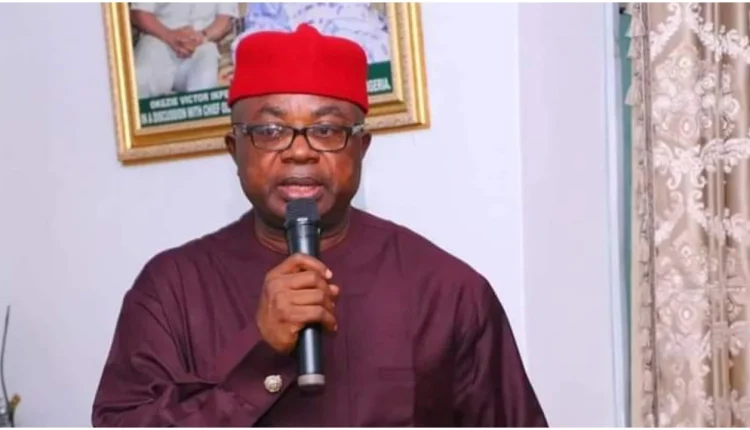By Ben Ngwakwe
A former member of the House of Representatives and member of the Board of Governing Council of the North East Development Commission, Sam Onuigbo has advocated for the North East to leverage climate action to address the challenges posed by climate change.
In his paper presentation on “Leveraging Climate Action for Sustainable Development of North East Nigeria” at the maiden retreat held at the International Conference Centre, Gombe, Onuigbo stated that climate action would help trigger and accelerate necessary development activities in all sectors of human endeavour in Nigeria.
According to him, “We must therefore begin to think and work towards exploring these opportunities. Roadmap to a sustainably developed North East leveraging on climate action,” while appreciating the work that has been done in repositioning the North East region.
“For this, we must applaud the Federal Government, State Governors, North East Development Commission, LGA heads, public and private sector stakeholders, traditional and religious leaders, community leaders, etc. However, what I wish to propose here is a roadmap to leveraging climate action and the immense opportunities it presents in a changing world, to position this important region as sustainably developed. I expect these focused actions to help trigger and accelerate necessary development activities in all facets of human endeavour in Nigeria,” he added.
The former lawmaker noted that one of the key factors that would guide coordinated and increased climate action, which will in turn lead to sustainable development, is the establishment of proper climate governance frameworks to guide actions.
According to him, a clearly articulated vision backed by SMART (Specific, Measurable, Achievable, Relevant, and Time-bound) goals and objectives, along with political will enshrined in a long-term vision, must be maintained to prevent changes in governmental leadership from altering progress.
He also advocated for the appointment of commissioners for climate change in the states, given the recent massive devastation in the region caused by climate change.
“Proper institutional arrangements must include having either a Commissioner for Climate Change, a Directorate of Climate Change, ensuring State Houses of Assembly provide oversight to climate action, ensuring inter-ministerial coordination, involving local government—keeping in mind that they are on the front lines—and clearly delineating the specific roles of each body or agency.
“Having proper policy frameworks and action plans is essential. These must include early warning systems that prepare our people for any climate emergencies. This assertion becomes even more important and urgent in view of the recent massive devastations in the region by climate change. I am happy that some of the states here already have Climate Change Action Plans while others are working to develop theirs,” he said.
Onuigbo further emphasised the need for legal frameworks to support these efforts, urging states to domesticate the Climate Change Act while considering the unique needs of each state.
In his words, “Climate change education and awareness creation should also be a key part of our governance framework. This is supported by the provisions of Sections 26 and 22 of the Act. Indeed, education is key, and so is the creation of awareness among our people. This, of course, links up with the need for continuous capacity building and training for stakeholders. Capacity building must include not just knowledge-sharing but also the encouragement of locally-led technological innovations.”
He stressed the importance of setting up proper monitoring and evaluation mechanisms, describing them as key audit processes that will allow for periodic evaluation of progress and necessary adjustments to meet goals and objectives.
“Integration of our plans and efforts with national and global goals is also critical, as it ensures alignment with what others are doing. Following the governance framework, we must kickstart key projects that will help address some of the developmental issues and position the region for massive growth,” he stated.
On climate-smart agriculture, Onuigbo said, “Climate-smart agriculture is an approach that guides actions to transform agri-food systems towards green and climate-resilient practices. It aims to tackle three main objectives: sustainably increasing agricultural productivity and incomes, adapting and building resilience to climate change, and reducing or removing greenhouse gas emissions where possible.”
He emphasised that because of the unique climate impacts in the North East region, such as desertification and land degradation, climate-smart agroforestry should be used to restore degraded lands, improve agricultural productivity, and enhance resilience to climate shocks. This is in line with Section 27 of the Climate Change Act. The North East stands to benefit by promoting and adopting nature-based solutions to reduce greenhouse gas emissions and mitigate climate change issues.
“With the world, and indeed Nigeria, battling food insecurity, climate-smart agriculture offers a solid opportunity to address this issue while boosting the revenue base and livelihood options of the people. This should not just be about cultivating and selling food crops as raw materials but also ensuring that the entire value chain is climate-smart, with processing and manufacturing hubs set up as well.”
Onuigbo outlined ways to achieve this at the cultivation stage, which include training farmers on climate-smart agricultural practices, providing improved seedlings, ensuring sustainable irrigation sources to reduce reliance on rain-fed agriculture, and promoting agroforestry.
“This development will lead to the provision of year-round irrigation for local farmers, enhance land productivity and soil fertility, and ultimately increase crop yield,” Onuigbo said.
He added that funding opportunities to support these initiatives are available, noting that the World Bank alone provides up to USD 3 billion annually for climate-smart agriculture.
“What we need to do is lay the foundations and then seek ways to access these funding opportunities.
“Knowledge, technology, and skills sharing are key drivers. Technology is essential to the advancement of any society. We have witnessed the rise of tech companies like Meta, which became a trillion-dollar company in a little over nine years. Adopting technology and ensuring our people are skilled in it not only reduces pressure on our land but also allows them to leverage local knowledge to create technological solutions that address climate change issues,” he noted.
Chief Ben Ngwakwe writes from Gombe.



